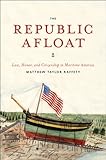The Republic afloat : law, honor, and citizenship in maritime America / Matthew Taylor Raffety.
Material type: TextSeries: American beginnings, 1500-1900: Publisher: Chicago ; London : The University of Chicago Press, [2013]Copyright date: ©2013Description: viii, 277 pages : illustrations ; 24 cmContent type: text Media type: unmediated Carrier type: volumeISBN: 9780226924007; 0226924009Subject(s): Maritime law -- United States -- History -- 19th century | Merchant mariners -- Legal status, laws, etc. -- United States -- History -- 19th century | United States -- History -- 1815-1861 | Maritime law | Merchant mariners -- Legal status, laws, etc | United States | Seeschifffahrt | Seehandel | Seerecht | Ehre | Nationalbewusstsein | USA | 1800-1899Genre/Form: History.DDC classification: 343.7309/62 LOC classification: KF1104 | .R34 2013
TextSeries: American beginnings, 1500-1900: Publisher: Chicago ; London : The University of Chicago Press, [2013]Copyright date: ©2013Description: viii, 277 pages : illustrations ; 24 cmContent type: text Media type: unmediated Carrier type: volumeISBN: 9780226924007; 0226924009Subject(s): Maritime law -- United States -- History -- 19th century | Merchant mariners -- Legal status, laws, etc. -- United States -- History -- 19th century | United States -- History -- 1815-1861 | Maritime law | Merchant mariners -- Legal status, laws, etc | United States | Seeschifffahrt | Seehandel | Seerecht | Ehre | Nationalbewusstsein | USA | 1800-1899Genre/Form: History.DDC classification: 343.7309/62 LOC classification: KF1104 | .R34 2013| Item type | Current library | Call number | Copy number | Status | Notes | Date due | Barcode |
|---|---|---|---|---|---|---|---|
 Books
Books
|
Female Library | KF1104 .R34 2013 (Browse shelf (Opens below)) | 1 | Available | STACKS | 51952000199489 | |
 Books
Books
|
Main Library | KF1104 .R34 2013 (Browse shelf (Opens below)) | 1 | Available | STACKS | 51952000199496 |
Browsing Main Library shelves Close shelf browser

|

|

|

|

|

|

|
||
| KF1070 .B365 2017 Speculation : a history of the fine line between gambling and investing / | KF1070 .R42 2014 Capital markets, derivatives, and the law : evolution after crisis / | KF1071 .H39 2011 Broker-dealer regulation in a nutshell / | KF1104 .R34 2013 The Republic afloat : law, honor, and citizenship in maritime America / | KF1105 .M34 2010 Admiralty in a nutshell / | KF1164.3 .D6 2003 Insurance law in a nutshell / | KF1250 .B427 2014 Basic tort law : cases, statutes, and problems / |
Includes bibliographical references (pages 219-266) and index.
Law. Learning the ropes: the legal structure of labor at sea ; The education of Samuel Betts: developing a national maritime law ; Discipline but not punish: the law and labor control at sea, 1790-1861 ; "All is violence": mutiny and revolt as labor negotiation -- Honor. Forecastle law: personal honor and the defense of custom at sea ; "Good officers make good men": the changing meanings of honor on the quarterdeck -- Citizen. Our man in Liverpool: the consular service and American citizenship ; "The very laws that preserved their liberty": seaman, citizenship and national identity ; "We are eminently a maritime people": seafarers and the American character -- Conclusion: Jack Tar, American.
"In the years before the Civil War, many Americans saw the sea as a world apart, an often violent and insular culture governed by its own definitions of honor and ruled by its own authorities. The truth, however, is that legal cases that originated at sea had a tendency to come ashore and force the national government to address questions about personal honor, dignity, the rights of labor, and the meaning and privileges of citizenship, often for the first time. By examining how and why merchant seamen and their officers came into contact with the law, Matthew Taylor Raffety exposes the complex relationship between brutal crimes committed at sea and the development of a legal consciousness within both the judiciary and among seafarers in this period. The Republic Afloat tracks how seamen conceived of themselves as individuals and how they defined their place within the United States. Of interest to historians of labor, law, maritime culture, and national identity in the early republic, Raffety's work reveals much about the ways that merchant seamen sought to articulate the ideals of freedom and citizenship before the courts of the land--and how they helped to shape the laws of the young republic"--Provided by publisher.
1 2

There are no comments on this title.